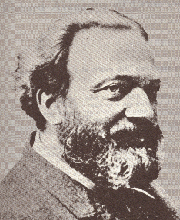Richard Avenarius
Richard Avenarius | |
|---|---|
 | |
| Born | 19 November 1843 |
| Died | 18 August 1896 (aged 52) |
| Alma mater | University of Zurich University of Berlin Leipzig University |
| Era | 19th-century philosophy |
| Region | Western philosophy |
| School | Empirio-criticism (Critical positivism)[1] |
| Institutions | Leipzig University University of Zurich |
Main interests | Empirical knowledge, philosophy of science |
Notable ideas | Empirical criticism |
Richard Ludwig Heinrich Avenarius (19 November 1843 – 18 August 1896) was a German-Swiss philosopher. He formulated the radical positivist doctrine of "empirical criticism" or empirio-criticism.
Life
Avenarius attended the Nicolaischule in Leipzig and studied at the University of Zurich, Berlin, and the University of Leipzig. At the University of Leipzig, he received the Doctor of Philosophy in 1868 with his thesis on Baruch Spinoza and his pantheism, obtained the habilitation in 1876 and taught there as Privatdozent. One year later, he became professor at the University of Zurich. He died in Zurich in 1896.
Work
Avenarius believed that scientific philosophy must be concerned with purely descriptive definitions of experience, which must be free of both metaphysics and materialism. His opposition to the materialist assertions of Carl Vogt resulted in an attack upon empirio-criticism by Vladimir Lenin in the latter's Materialism and Empirio-criticism.
Avenarius' principal works are the famously difficult Kritik der reinen Erfahrung (Critique of Pure Experience, 1888–1890) and Der menschliche Weltbegriff (The Human Concept of the World, 1891) which influenced Ernst Mach, Ber Borochov and, to a lesser extent, William James.[2]
He taught Anatoly Lunacharsky and was also influential on Alexander Bogdanov and Nikolai Valentinov.
Family
Avenarius was the second son of the German publisher Eduard Avenarius and Cäcilie née Geyer, a daughter of the actor and painter Ludwig Geyer and a (step-)sister of Richard Wagner. However, there is speculation that her father was the biological father of Richard Wagner too. Richard Avenarius's brother, Ferdinand Avenarius, led the cultural organization Dürerbund and belonged to the initiators of a culture reform movement in Germany. Wagner was Avenarius's godfather.[1]
Bibliography
- Ueber die beiden ersten Phasen des Spinozischen Pantheismus und das Verhältnis der zweiten zur dritten Phase. Eduard Avenarius, Leipzig 1868.
- Philosophie als Denken der Welt gemäß dem Prinzip des kleinsten Kraftmaßes. Prolegomena zu einer Kritik der reinen Erfahrung. Fues, Leipzig 1876; 2nd ed. 1903.
- Kritik der reinen Erfahrung, (Critique of Pure Experience) 2 vols. Fues, Leipzig 1888/1890; 2nd ed. 1907/1908.
- Der menschliche Weltbegriff. Reisland, Leipzig 1891; 2nd ed. 1905; 3rd ed. 1912.
Notes
^ See John Deathridge, "Introduction" p. XXXIII in Richard Wagner. The Family Letters of Richard Wagner, University of Michigan Press, 1991. ISBN 0-472-10292-3
References
- ^ "The critical positivism of Mach and Avenarius": entry in the Britannica Online Encyclopedia
- ^ David C. Lamberth, William James and the Metaphysics of Experience, Cambridge University Press, 1999, p. 86.
External links
- Works by or about Richard Avenarius at the Internet Archive
- Literature by and about Richard Avenarius in the German National Library catalogue
- Max Heinze (1902), "Avenarius, Richard", Allgemeine Deutsche Biographie (in German), vol. 46, Leipzig: Duncker & Humblot, pp. 147–149
- Wolf Strobl (1953), "Avenarius, Richard", Neue Deutsche Biographie (in German), vol. 1, Berlin: Duncker & Humblot, pp. 468–468
- Friedrich Carstanjen, Richard Avenarius and His General Theory of Knowledge, Empiriocriticism (1906)
